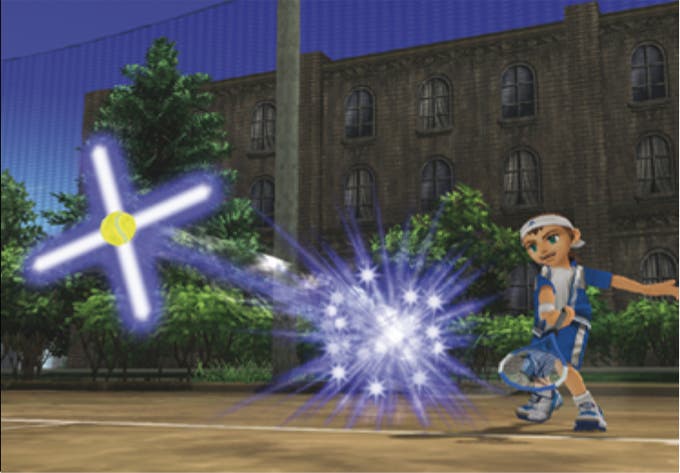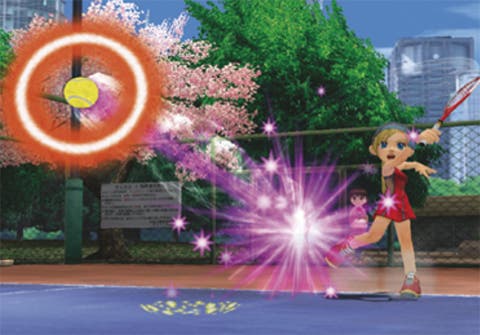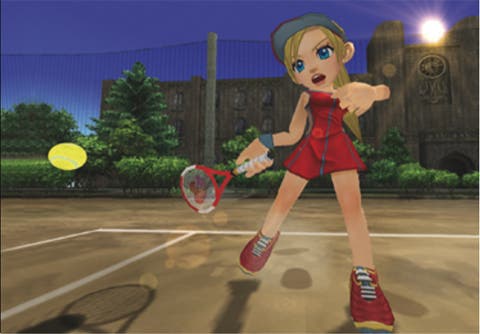Everybody's Tennis
Presumably everybody except me.
More than five years ago, Clap Hanz finished the game design for Everybody's Tennis, and then promptly put it on the back burner while it turned its attention to its cute, hugely playable golf titles on PS2 and PSP. It's perhaps hardly surprising, then, that this charming but lightweight effort bears all the hallmarks of an early PS2 title stuck in its own sweet time warp.
On the plus side, Everybody's Tennis is an instantly playable game full of cute touches - just like its under-rated golfing brother, in fact. Borrowing Everybody's Golf's big-headed animé graphical styling, this isn't a game that tries too hard to simulate the finer points of the racket sport, but instead exaggerates the key mechanics and attributes in a way that puts it somewhere between Mario Power Tennis' and, say, Virtua Tennis.
In a broad sense, Everybody's Tennis feels like a comedy version of Virtua Tennis, complete with silly animations and onomatopoeic comic touches whenever, say, a player gets smacked in the face by the ball. It's likeable for this and many other slightly slapstick reasons, but is held together at its core by a the same control system that makes VT such a charm to play.
Tap tap

To serve, there's no power bar to observe, but it works on the same double tap principle that sees your player firstly chuck the ball up in the air, and then bring the racket down upon it at the optimum moment. Where it lands, and with how much power is down to a combination of precision timing and the capabilities of your player, with slower players giving you an easier, but less powerful serve. It's an interesting trade-off, and as such makes serving a lot trickier to master than VT - especially once you start to play as some of the more advanced players.
The general court play works on much the same principle as you'd expect, though, with X controlling the most of your basic stroke play, with triangle to lob and circle to slice. For the most part, though, the placement of your shot is calculated by determining your timing (on time, too early or late) along with the direction you place the shot in, as well as your stats. For example, if your chosen character is good at volley shots, you'll be better at net play, while fast runners will be able to make last ditch returns when all seems lost.
That's the theory, anyway. In practice, games play out with a reasonable amount of fluidity without ever truly feeling convincing. For instance, hitting a shot too early can result in it spooning haplessly into the air (complete with comedy sound effect), allowing your opponent an opportunity to smash the return out of your despairing reach. At other times, though, a mistimed shot can just as easily win you a rally, while a sweetly struck volley may well end up being countered with ferocity and lose you the point. It's a strangely inconsistent and often plain random game, but one that's mildly enjoyable nonetheless.
"No challenge"

Perhaps where the interest levels start to wane is the overall lack of challenge in the inappropriately named Challenge mode. Progress through the numerous tiers isn't going to cause the average tennis gamer to even break a sweat, as long as you're canny enough to use the best player available to you when the opportunity presents itself. Rather than adopt a 'create a player' approach, you simply get to choose whoever's available, and beating superior opponents then allows you to easily meet your career ambitions by using them instead. There's no incentive to sticking with one particular player, either, with no experience system or upgrades to be won, and as such your progression through the ranks feels pretty hollow almost from the beginning, with mere costumes and venues dished out as reward. And with no career player to build up, it's almost entirely pointless to engage with the rather basic training games, other than to better your own score at them.
And because the game keeps unlocking better players for you to control, the game barely feels any more difficult than when it starts. Sure, the AI players stop being quite as stupid as they initially look, and start throwing special cheating curved shots at you, but otherwise it's pitched pretty much at your level throughout.
Also, Clap Hanz don't even bother with putting you through anything as taxing as a proper tournament. The bulk of the stages in the game requires you to win just four games to progress, rather than, say, two sets of six games. And with no quarter finals or semi finals to work your way through, there's little sense of tension - any failure is short-lived and can be remedied in a matter of minutes, which might alleviate frustration, but makes progress a perfunctory, routine task.
Offline odyssey

Beyond the basic single player affair, there's the usual offline multiplayer singles or doubles matches to enjoy, but no attempt to even bother with something as complicated as online. That's hardly surprising given the somewhat low-key status of the game, but still a pretty basic requirement for a tennis game in 2007. Obviously it's unfair to compare this to VT3, but even stood next to the PS2 versions of VT2 and TopSpin it doesn't come close to troubling their reputations. It's solid enough on its own merits, but stands in that rather anonymous middle ground shared by the likes of Smash Court Tennis.
Technically it's very much in 'okay if you like that sort of thing' territory. Now, I'm hardly the world's biggest fan of cutesy animé girls in short skirts and tight tops, but if that floats your boat, you'll be well catered for. In terms of the fluidity and animation, it does a reasonable job, but the lumbering style doesn't really work with the slightly wonky AI - in a sense it makes the players look like people dressed in comedy animé suits, with a hobbled running style to match. Sonically, it's elevator city, and Clap Hanz is the mayor. Quite how this wafting nonsense ever gets commissioned is beyond me. Or maybe it's just a random lift music generator...
On balance, Everybody's Tennis is a fun, air-headed game with no game breaking flaws, but the half-hearted single player mode and lack of any long-term challenge makes it feel like a contractual obligation than something designed to take the genre forward in any way whatsoever. All told, it's just a solid, by-the-numbers Virtua Tennis clone with a generic cast of Clap Hanz creations. If you really must have a tennis game on your PS2, the bargain basement will serve you far better than this rather apologetic 'will this do?' offering. Better still, ignore it entirely and get Virtua Tennis 3 on one of four different platforms.


